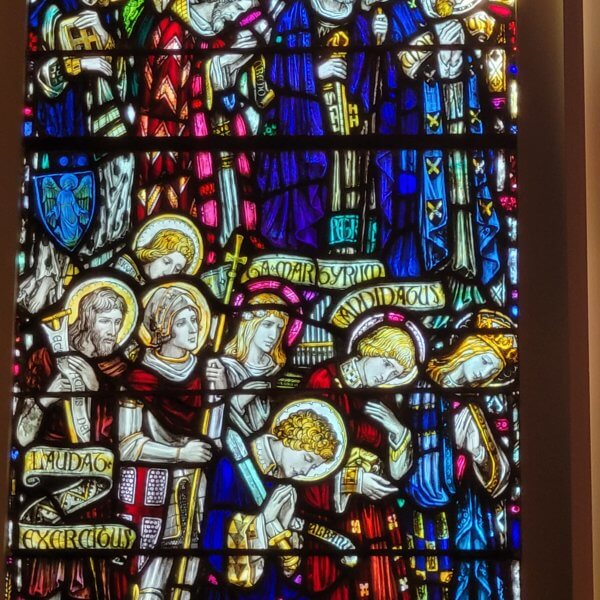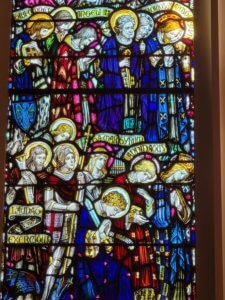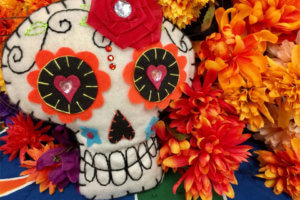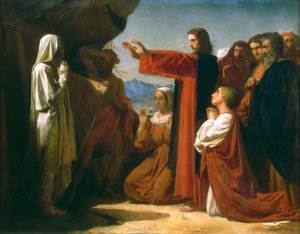
God Helps Ordinary Saints
 Today we observe All Saints’ Day, one of the seven principal feasts in the Episcopal Church. All Saints’ Day is a fixed feast day, meaning that it occurs on a certain day — November 1 — each year, which is different from a moveable feast. You probably remember at least the title of Ernest Hemingway’s 1964 memoir — A Moveable Feast — chronicling his life as a journalist and writer in 1920s Paris. The title actually comes from the way the Western Church determines when Easter falls in each year — the first Sunday after the full moon occurring on or after March 21. And then Easter’s date determines the dates of all of the other moveable feasts of the Church. There’s another factor that affects fixed principal feast days, like All Saints’ Day, which occurred on the calendar last Monday, November 1. We can move our celebration of a fixed principal feast to the next following Sunday — without special permission from the bishop.
Today we observe All Saints’ Day, one of the seven principal feasts in the Episcopal Church. All Saints’ Day is a fixed feast day, meaning that it occurs on a certain day — November 1 — each year, which is different from a moveable feast. You probably remember at least the title of Ernest Hemingway’s 1964 memoir — A Moveable Feast — chronicling his life as a journalist and writer in 1920s Paris. The title actually comes from the way the Western Church determines when Easter falls in each year — the first Sunday after the full moon occurring on or after March 21. And then Easter’s date determines the dates of all of the other moveable feasts of the Church. There’s another factor that affects fixed principal feast days, like All Saints’ Day, which occurred on the calendar last Monday, November 1. We can move our celebration of a fixed principal feast to the next following Sunday — without special permission from the bishop.
So is anyone still with me? Why does all of this matter? I’d like to talk about that today. This may all sound like a lot of arcane, historical detail, but I think that our celebration of All Saints’ Day — and all of our religious holidays — are actually vitally important, both to our emotional and physical health and to our very survival as a community and a civilization. I know that’s a big claim, so let me step back a little and explain.
Connection
The Diocese of Rhode Island held its annual convention yesterday. It’s the second one in a row we’ve had on Zoom instead of in person. And while we’ve all learned to be flexible — by necessity — and we’ve grown to be resilient, it’s also true that we need connection. We need to see each other face to face, to celebrate our joys, grieve for our sorrows, and walk through the rhythm of our days — together.
 Human beings yearn for our lives to have order, structure, and seasonal rhythms that we can anticipate and prepare for as a community. It keeps us ready for the kinds of responses we need in emergencies, such as a global pandemic. And we’re starved for it — thirsty for it — like the psalmist describes the deer who longs for the cool water streams, we long for our mutual connection through God. This is how we make meaning of our lives. We need to be part of an unfolding story — the story of our community living with God in our midst. And the fact is, that’s the role scripture and the life of the church have played in our lives for centuries — whether we’re Roman Catholic, or Episcopalian, Orthodox or Reformed Jews, or Muslims of any denomination.
Human beings yearn for our lives to have order, structure, and seasonal rhythms that we can anticipate and prepare for as a community. It keeps us ready for the kinds of responses we need in emergencies, such as a global pandemic. And we’re starved for it — thirsty for it — like the psalmist describes the deer who longs for the cool water streams, we long for our mutual connection through God. This is how we make meaning of our lives. We need to be part of an unfolding story — the story of our community living with God in our midst. And the fact is, that’s the role scripture and the life of the church have played in our lives for centuries — whether we’re Roman Catholic, or Episcopalian, Orthodox or Reformed Jews, or Muslims of any denomination.
Our saints days, festivals, and holidays are rooted in the story of our faith and gain meaning and relevance to us as they are linked to the seasonal rhythms of our local culture. We’ll talk more about how specific events in the story of our faith came to be celebrated at certain times of year on another Sunday. But for now, let’s just recognize our human need to be part of an unfolding story. We yearn to experience time that is ordered — in seasons of weather, sports, foods, and gatherings — and punctuated with major events. Who’s ever said any of these things? We’ll get that done before Christmas. We’ll see you after Easter. Let’s plan that for our summer vacation before pledge season starts up in the Fall. Next year in Jerusalem!
How to Celebrate All Saints’ Day
So how do we celebrate All Saints’ Day, this fixed principal feast that we can transfer to the following Sunday without the bishop’s permission? Our altar hangings and vestments are white today, not green for Ordinary Time. We will pray our necrology, remembering those from our church community who have gone on to God since All Saints’ Day last year. Praying for our loved ones who have died is actually a really interesting part of how we traditionally honor All Saints’ Day.
 All Saints’ Day is the middle day of the triduum of Allhallowtide, which is made up of Halloween, All Saints’ Day and All Souls’ Day. Halloween, or All Hallows’ Eve, is the day before All Saints’ Day. Hallow is an Old English word for saint, so another name for All Hallows’ Eve would be All Saints’ Eve. Pope Boniface IV established All Saints’ Day in around 609 A.D. as a day of celebratory remembrance for all of the Church’s martyrs. November 2, the third day in the triduum, is All Souls’ Day, when we traditionally honor the souls of the faithful dead, also known as the church triumphant. We the living faithful are called the church militant, which doesn’t mean that we are a warlike people — just that we’re still marching around on earth.
All Saints’ Day is the middle day of the triduum of Allhallowtide, which is made up of Halloween, All Saints’ Day and All Souls’ Day. Halloween, or All Hallows’ Eve, is the day before All Saints’ Day. Hallow is an Old English word for saint, so another name for All Hallows’ Eve would be All Saints’ Eve. Pope Boniface IV established All Saints’ Day in around 609 A.D. as a day of celebratory remembrance for all of the Church’s martyrs. November 2, the third day in the triduum, is All Souls’ Day, when we traditionally honor the souls of the faithful dead, also known as the church triumphant. We the living faithful are called the church militant, which doesn’t mean that we are a warlike people — just that we’re still marching around on earth.
Lazarus
When we pray for those connected to our community who have died since last All Saints’ Day, we’re praying for the souls of the faithful departed — the church triumphant, not for saints or martyrs — so the necrology is really more of an All Souls’ Day observance. We also celebrate All Saints’ Day with our gospel readings. Last year in our lectionary, we read the Beatitudes, which are all about blessedness. And today, we read about Lazarus, whom Jesus raises from the dead. Lazarus’s name in Aramaic and Hebrew is closer to Eleazar, meaning God helped. And Lazarus is honored as a saint by Roman Catholics, Eastern Orthodox, and even some provinces in the Anglican Church, including the Church of England, as the one God helped up from the dead.
 Lazarus’s sisters, Mary and Martha, implore Jesus to come heal Lazarus before he has died, and then even scold him a little when Jesus finally shows up in Bethany to raise Lazarus after he’s been dead four days. Because, as always, there’s more to the story than we read today here in church. Mary and Martha walk for a whole day from Bethany down to the Jordan River near Qumran to tell Jesus that Lazarus is sick. And instead of rushing back to Bethany, Jesus stays three more days down at the Jordan before his day-long walk up to Bethany across the Kidron Valley from Jerusalem. By the time he gets to Bethany, Lazarus has died, and Mary and Martha tell Jesus that if he’d hurried, Lazarus would still be living. Even so, Mary and Martha are honored as saints. God helped Lazarus — Eleazar — raising him up from the dead, as God restores life in our communities through our connections to each other.
Lazarus’s sisters, Mary and Martha, implore Jesus to come heal Lazarus before he has died, and then even scold him a little when Jesus finally shows up in Bethany to raise Lazarus after he’s been dead four days. Because, as always, there’s more to the story than we read today here in church. Mary and Martha walk for a whole day from Bethany down to the Jordan River near Qumran to tell Jesus that Lazarus is sick. And instead of rushing back to Bethany, Jesus stays three more days down at the Jordan before his day-long walk up to Bethany across the Kidron Valley from Jerusalem. By the time he gets to Bethany, Lazarus has died, and Mary and Martha tell Jesus that if he’d hurried, Lazarus would still be living. Even so, Mary and Martha are honored as saints. God helped Lazarus — Eleazar — raising him up from the dead, as God restores life in our communities through our connections to each other.
Saint Hymns
 We also celebrate All Saints’ Day with some of our best saint hymns, including Hymn 293, I sing a song of the saints of God, my personal favorite, which we’ll sing as our recessional hymn. Remember, she who sings well prays twice. Pay close attention to the words of I sing a song of the saints of God, because I have a special Allhallowtide trivia question. My family is celebrating the Atlanta Braves’ World Series victory Wednesday night with special regional and familial pride. Jere’s dad, who joined the church triumphant in June of this year as many of you know, was one of the Braves’ team doctors for many years. In honor of the Braves’ Championship victory that would have made Dad Wells very proud — and in celebration of All Saints’ Day at Emmanuel with the special intention of creating connection, meaning, and structure in our lives, I ask this question: To which day of the Allhallowtide Triduum — Halloween, All Saints’ Day, or All Souls’ Day — is Hymn 293 most theologically appropriate — and why? Amen
We also celebrate All Saints’ Day with some of our best saint hymns, including Hymn 293, I sing a song of the saints of God, my personal favorite, which we’ll sing as our recessional hymn. Remember, she who sings well prays twice. Pay close attention to the words of I sing a song of the saints of God, because I have a special Allhallowtide trivia question. My family is celebrating the Atlanta Braves’ World Series victory Wednesday night with special regional and familial pride. Jere’s dad, who joined the church triumphant in June of this year as many of you know, was one of the Braves’ team doctors for many years. In honor of the Braves’ Championship victory that would have made Dad Wells very proud — and in celebration of All Saints’ Day at Emmanuel with the special intention of creating connection, meaning, and structure in our lives, I ask this question: To which day of the Allhallowtide Triduum — Halloween, All Saints’ Day, or All Souls’ Day — is Hymn 293 most theologically appropriate — and why? Amen
